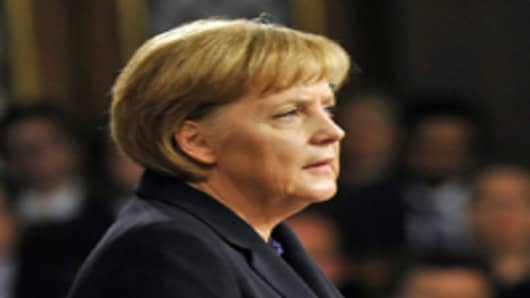Germany’s Chancellor will look to reassure Chinaduring a trip to Beijing this week that a debt crisis in the euro zone is under control and that Chinese investments are secure, but that doesn’t mean Beijing will be convinced to invest more money in Europe’s troubled states, analysts tell CNBC.
Angela Merkel is in China on Thursday and Friday and although talks with Chinese officials are expected to cover a range of topics such as trade relations and conflict in Syria, the key focus is likely to be the euro zone debt crisis.
The trip is Merkel’s second to Beijing this year and highlights the growing importance of German-Chinese relations. Europe is China’s biggest export market and the euro zone debt crisis has added to the woes of Chinese policymakers grappling with a Chinese economy that has slowed for six consecutive quarters.
“The trip has a lot of ambitions: one, is to explain the euro zone debt crisis to the Chinese and two, convince the Chinese to keep supporting the euro zone and buying the bonds from some of the euro zone countries such as Italy and Spain and also Germany,” Simon Shen, Professor at the Chinese University of Hong Kong’s Faculty of Social Science told CNBC Asia’s “The Call” on Thursday.
“At most, there will be friendly gestures from the Chinese, but in terms of the substantial outcome, that is a little bit unlikely,” he added.
Reuters reported Thursday quoting Xinhua news agency that China was willing to buy more EU government bonds if it can fully assess the risks involved.
But analysts say, the Chinese may be reluctant to support efforts to buy peripheral euro zone bonds after having had their fingers burnt before. Earlier this year, Chinese investors were forced to take significant losses on Greek bonds following a Greek debt restructuring plan.
A second reason for hesitation is that if the Chinese are going to buy European debt, there is likely to be a preference by the Chinese, like most foreign investors, to hold ‘safer’ German bonds over peripheral debt, analysts said.
While bond yields in Spain and Italy have risen this year, yields on benchmark 10-year German government bonds have declined about 45 basis points to about 1.37 percent because they are perceived as a relative safe-haven.
Bonds for Sale
“What Germany needs is people to buy peripheral debt, but there are no buyers out there,” said Alistair Thornton, Senior Economist at IHS Global Insight. “China probably has increased its holdings of European bonds, but most likely German debt and not peripheral bonds.”
The euro zone debt crisis has been given a reprieve in recent weeks following strong rhetoric from European Central Bank President Mario Draghiand other officials pledging to do whatever it takes to save the euro area from a collapse. Such remarks have helped push yields on benchmark 10-year Spanish government bonds down from unsustainable levels above 7 percent seen in late July.
European leaders have called on China, which has the world's largest foreign exchange reserves, to invest in a bailout fund to support troubled euro zone states, but China has shied away from making a significant commitment to financial assistance.
Italy’s deputy economy minister was reported to have visited Beijing back in April to convince Chinese investors to buy Italian government bonds, which have also come under pressure in recent months.
“Buying bonds is not a foreign policy objective for China, but something they will do if they think it is in China’s interests and the meeting with Merkel won’t change that,” said Tim Condon, Head of Research, Asia, at ING Financial Markets in Singapore.
Ultimately, the resolution of the euro zone debt crisis will not depend on increased financial support from China but political developments in the euro zone itself, according to Thornton at IHS.
“It is an interesting relationship (Germany-China) and a lot has been made of European leaders coming to get support from China for the European bailout fund,” he said. “China can help Europe build a stronger safety net, but it can’t help Europe from falling over – that will be up to Europe.”
- By CNBC's Dhara Ranasinghe




